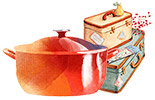The link between our health and the content of our food is an essential element that has been considered for thousands of years.
Our health begins with our diet
The oldest medical treatises found are already concerned with what the patient eats and give recommendations for various diets to improve or maintain health.
What changes is not the primary concern, but the answers that are given. They depend, of course, on the progress of science, but not only that.
The state of global economic development and personal standard of living play an important role, depending on whether you live in a rich or poor country, whether you are able to buy healthy products or not.
Added to this are possible personal health problems, which can be exacerbated by pollution, the type of food available, ignorance, etc.
In developed countries, there is no longer any interest in preventing goitre and rickets, which were major concerns just over a century ago. Allergies, lactose intolerance and gluten intolerance, on the other hand, have become everyday problems.
Finally, beyond the sheer quest for nutritional balance, organic and ethical issues have become essential for many.
Modern developments: junk food, industrialisation, etc.
The rejection of a type of industrial agriculture that has objectively allowed famines to disappear in times of peace is linked to its excesses and to fears about the future of the planet. Eating better opens up to living better, cultivating better and producing better.
From the "MacDonald's eater" to the rigorous and moralistic vegan, the spectrum is so wide…
It is difficult, in some cases, to distinguish between what is most important: rejection of animal suffering or better living? Do we become vegans out of morality or out of concern for our well-being? The question is not insignificant, because this diet in particular requires a great deal of dietary knowledge to be "healthy".
Youtube is the setting for a merciless war between the "nice" vegans, who are in favour of a gradual evolution, the repentant ones, who have given up in the face of real difficulties, in particular permanent stomach pains, and the "hardliners" who don't understand that one can eat anything derived from animal exploitation, including even honey.
And then it all depends on where you live.
Here, we also think about our wallets.
The paradox is real: it will be easier to eat "organic", "healthy" and even "vegan" if you live in a big city than if you are in a small village (and you are not a farmer). Here we touch on another difficulty: eating organic and local is not always easy.
While it is easy to avoid major heresies (such as strawberries or melons brought in from the West Indies for Christmas), in France it has been a long time since villages have had working mills, and farmers, for reasons of hygiene, are no longer allowed to sell certain products directly. In Morocco, on the other hand, it is still easy to make artisanal products, but the problem is finding the right products.
The cost of transport and its carbon impact also play a role in global pollution.
So what can we do?
First of all, be reasonable.
Do not confuse, for example, coeliac disease, gluten intolerance and problems linked to the poor quality of flours. In other words, don't go on a "gluten-free" diet on principle, because it would be better for your health. Yes, for 4% to 10% of the population. No for the vast majority.
Set your priorities.
In a formulation that would make anti-speciesist vegans howl, Pascal said that "he who wants to be an angel makes a beast". In the modern world, it is difficult to fight against "everything", especially since some issues are generated by industry much more than by the individual. Some objectives can even be contradictory (fair trade in organic products generates, despite everything, significant pollution for the transport of coffee, quinoa, etc.).
To be reasonable, you have to sort out what is really important and the deviations you allow yourself… like in a weight loss diet. And this is a personal decision.
Get informed.
Sometimes go looking for the little beast, check the composition of products without being frightened by certain acronyms that are only the codification of common products. Be wary — on principle — of all miracle products. Know the cycle of the seasons, so as to eat really fresh products. Organise yourself, perhaps, to grow herbs and vegetables at home… not easy, without a balcony or terrace, but "doable".
Indulge yourself.
The first condition for eating well is to enjoy it. Preparing meals, eating, should be neither a chore nor a duty, but a pleasure and a moment that we offer ourselves, both for well-being and conviviality.
My dive into cooking was accompanied by an awareness of these components of "eating well". In addition to the recipes, I wanted to share these thoughts, the discoveries I have made over the past few years, my successful and failed attempts.
I am lucky enough not to be lactose or gluten intolerant, nor to have any food allergies. I am a flexivore, having greatly reduced my meat consumption, without reducing it to zero. I do, however, have "eating disorders" (to put it plainly, I am bulimic) and taking the time to cook, paying attention to what goes on my plate, and varying the flavours has enabled me to stabilise.




